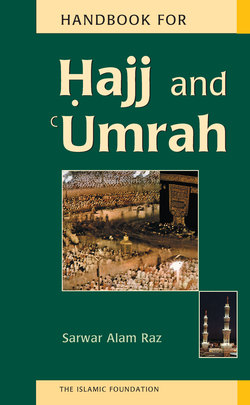Читать книгу Handbook for Hajj and Umrah - Sarwar Alam Raz - Страница 10
ОглавлениеCHAPTER 1
How to Use This Handbook
The writer’s experience with the existing texts available on the subject of Ḥajj and ʿUmrah, which provided him with the incentive and justification for writing this handbook, has already been mentioned in the Introduction, A Personal Note. The format and the subject matter presented in this book are a direct outcome of that experience.
Even a quick and cursory glance through these pages will show that their structure, organisation, and textual format are radically different from most books on the subject. In order to be able to use it in the most efficient way possible, it is recommended that the reader follow the sequence of study suggested below. It is the writer’s opinion that any attempt to circumvent the suggested methodology is likely to cause confusion and, indeed, will be self-defeating in that it would force the reader eventually to revert to the suggested sequence.
Since the thrust of this book is a simplification of the understanding of Ḥajj and ʿUmrah, the following sequence of study is strongly recommended:
(1) Familiarise yourself thoroughly with the terms defined and described in Chapter 2 (Glossary). All the technical and ritual details of Ḥajj and ʿUmrah that follow in subsequent sections use these terms extensively without elaborating upon them in the text. You will be lost without an adequate study of this Chapter.
(2) Skip Chapter 3 (Before You Leave) and Chapter 4 (When You Get to Saudi Arabia), except for Sections 3.1, 3.2 and 3.3 which contain useful information about the prerequisites of Ḥajj. The rest of these chapters advise you on how to prepare for Ḥajj, what to pack for the journey, etc. They can wait till later. Use the information you have learned in Chapter 2 to your advantage since it is still fresh in your mind, and proceed to Chapter 5 to learn the technical aspects of Ḥajj and ʿUmrah in its light.
(3) Go to Chapter 5 (Ḥajj and ʿUmrah) and study it in the light of Chapter 2. You may need to return frequently to Chapter 2 to refresh your memory about the definitions and procedures. You must be fully comfortable with your understanding of all that is involved in Ḥajj and ʿUmrah before you advance any further in your reading. At this stage, you may also want to decide on the type of Ḥajj you wish to perform and pay special attention to its specific details.
(4) You may now read Chapter 3 and Chapter 4. You can also start planning your schedules, travel and residential arrangements, etc. in the light of this information. Talk to your travel agent if any questions come to your mind during this study that are not answered in these chapters.
(5) Save Chapter 6 (Prayers and Supplications) for a rainy day when you have a reasonable amount of time to memorise any or all of the prayers if you so desire. The seven prayers for Ṭawāf of the Kaʿbah are highly recommended. They possess an intensity of emotion and devotion that increases as the Ṭawāf progresses. It moves you even as it enlightens you, and it reaches its zenith in the seventh prayer where you find yourself asking Allah for His ultimate Grace and Mercy.
Take your time in memorising the text as well as understanding the meaning of these prayers. They will keep you focussed before and during your journey on your mission of Ḥajj, as well as on your obligations towards Allah.
(6) You may defer reading Chapter 7 (A Visit to Madinah) to the last. Even though the visit is not a part of either Ḥajj or ʿUmrah, every pilgrim goes to Madinah out of love for Rasūl Allāh who is buried in Al-Masjid al-Nabawī. There are a large number of places of religious and historical importance in and around Madinah. You will, doubtless, want to visit them also.
As a matter of convenience, this handbook is written as if addressed to male pilgrims only. Needless to say, all information presented is equally applicable to female pilgrims. Such information as is meant for male pilgrims only is self-evident. Information which is intended exclusively for female pilgrims has been italicised for speedy recognition.
